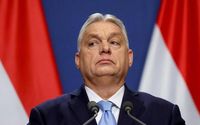Hungarian Prime Minister Viktor Orban has taken a firm stance against the European Union's plans to phase out reliance on Russian energy resources, warning that such a decision, if made by a qualified majority vote, could impose a heavy financial burden on Hungary.
In an interview with Kossuth radio, Orban stated that the EU's proposal to abandon Russian gas, oil, and nuclear fuel would cost Hungary an additional 2 billion euros daily, significantly increasing utility bills for Hungarian families. He emphasized that the current rules require unanimous agreement on energy issues and labeled any attempt to change this procedure as a dangerous precedent.
"We need to gather allies, we need to prepare legally. There is indeed a plan to circumvent the unanimous decision and adopt it by a qualified majority," Orban said, expressing his concerns about the implications of the EU's energy policy.
On May 6, 2025, the European Commission unveiled a roadmap aimed at completely halting Russian gas imports by the end of 2027, alongside minimizing imports of Russian oil. This has raised alarms in Hungary and Slovakia, the only EU countries heavily reliant on Russian energy supplies.
Orban also criticized the EU's approach regarding Ukraine's potential accession to the bloc. He stated unequivocally that Hungarian families would not be made to finance Ukraine's EU membership. He echoed sentiments expressed by Slovak Prime Minister Robert Fico, who warned that the European Commission's proposal could lead to the bankruptcy of Europe and impose unbearable burdens on Central European families.
"Robert Fico is right. Ursula von der Leyen's proposal will lead to bankruptcy for Europe and place an unbearable burden on Central European families. We will not allow Brussels to make Hungarian families pay for Ukraine's accession to the EU!" Orban declared on social media.
Orban's remarks come amid ongoing discussions between Russia and the United States regarding the possible resumption of Russian gas supplies to Europe, which some media sources suggest could help stabilize the ongoing conflict in Ukraine.
Orban's government is reportedly preparing legal and diplomatic measures to counteract the EU's plans, seeking allies among other member states. The Prime Minister's concerns reflect a broader anxiety within Hungary regarding the economic implications of the EU's energy transition and geopolitical maneuvering.
As Hungary navigates these turbulent waters, the Prime Minister's rhetoric underscores a commitment to protect the interests of Hungarian families while also positioning the nation as a key player in the EU's energy discussions. The potential for rising energy prices due to the EU's proposed ban on Russian gas is a pressing concern for the Hungarian government, which is already grappling with the economic fallout from the ongoing conflict in Ukraine.
In summary, Orban's opposition to the EU's energy strategy and his insistence on protecting Hungarian families highlights the complexities of energy politics in Europe today. With the EU pushing for a rapid transition away from Russian energy, Hungary's unique position as a country heavily reliant on these resources adds a layer of tension to the unfolding situation.
As the EU continues to deliberate on these energy policies, the implications for Hungary and its citizens remain a focal point of concern. Orban's push for unity among similarly affected nations may shape the future discourse on energy independence and economic stability within the EU.
In the coming months, all eyes will be on Hungary as it seeks to navigate these challenges while advocating for its national interests in the face of broader EU initiatives.


